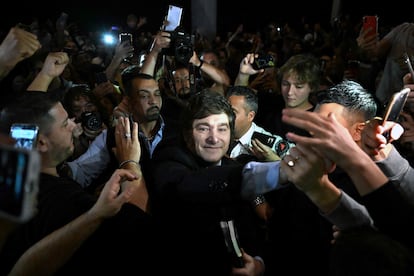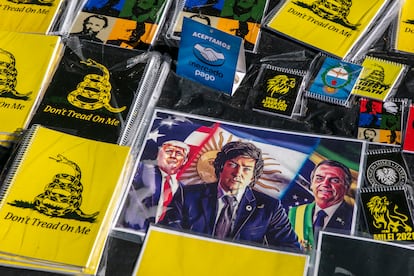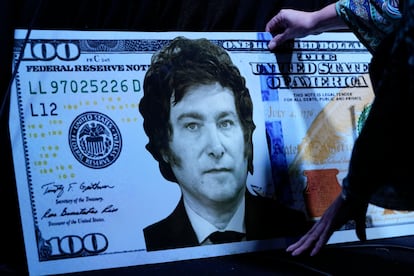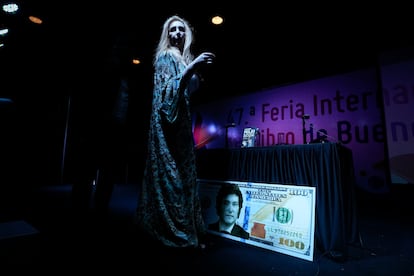Javier Milei, presidential candidate: ‘It’s super easy to dollarize Argentina’s economy’
The right-wing libertarian sat down with EL PAÍS to discuss his radical proposals to reform his country’s economic system. He declares himself to be against ‘anything obligatory,’ including compulsory voting

From the 12th floor, Javier Gerardo Milei, 52, looks towards the Río de la Plata – the widest river in the world – and thinks about what his life might be like after 2031. He imagines that, after serving two presidential terms, he will bid farewell to public service, triumphant after having dollarized the Argentine economy and done away with one of the highest rates of inflation in the world. In this scenario, he has also buried the political “caste” in the name of libertarian liberalism. With his job complete, he then settles in the countryside and devotes himself to his three sources of happiness: his English mastiffs, his sister Karina and the study of economics.
Milei – a national deputy and leader of La Libertad Avanza (Liberty Advances), a right-wing political coalition – takes a moment to reflect on this future, despite the nuisances of a busy Monday in the final stretch of a presidential campaign. He’s jet lagged after his return from New York City and tired after an argument with the designer of a campaign spot. There’s a flash of anger when an EL PAÍS photographer asks – in a respectful whisper – if he could please smile for the photos. “They’re mistreating me,” he whines several times, raising his voice. He demands the presence of his sister, whom he calls El Jefe (The Boss).

This overflowing anger is well-known. Milei has deployed it repeatedly as a television panelist, until he decided to devote himself to what he refers to as the “cultural war.” In 2021, he raised the volume of his rhetoric to even higher decibels, when he entered political life with an astonishing electoral result: he garnered 17% of the votes in his native city of Buenos Aires, entering the National Congress.
Milei’s anger seems crucial if he wishes to represent a portion of the electorate that is witnessing the decline of the country. The data is overwhelming: the annual rate of inflation stands at 115%, while poverty has climbed to 40%. His anti-system candidacy is offering a menu of novel proposals for the frustrated citizenry, such as the dollarization of the economy and the legalization of handguns. However, he has also become entangled in controversies, such as when he defended the sale of organs and babies, a subject that he has decided not to revisit in the campaign.
The economist and TV personality has an air of familiarity with other right-wing leaders in the Americas, such as Jair Bolsonaro in Brazil, José Antonio Kast in Chile and Donald Trump in the United States. A key difference is that Milei doesn’t have the nationalistic tilt of these men.
He drafted his first major academic work at the age of 20, while studying economics at the University of Belgrano, in Buenos Aires. He wrote it while also playing as a goalkeeper for Chacarita Juniors, a second-division professional soccer club. The thesis, “Hyperinflation and Distortion in the Markets,” is stuck inside a computer somewhere and nobody has been able to extract it from there. In a way it serves as Proust’s madeleine, allowing Milei to spend 14 minutes reminiscing about his intellectual adventures as a student, establishing conversations between scholars and explaining his devotion to the Austrian school of economics.
After the anger over being asked to smile for the camera, Milei sits down in a sparsely-furnished office. He faces the Río de la Plata, watching the water. Finally, his tone becomes more calm. He begins to talk for two hours.

Question. In your publications, one can see both a scientific Milei – the professor and author– and the political Milei. For the first person, the economy is a process. For the second, emergencies and promises appear, such as ending inflation. How will you reconcile these two personas if you’re elected to the presidency?
Answer. That question is the cuore (heart) of the Argentine problem. No politician gets involved in any long-term project, because they cannot get any political gain from it. The Argentine problem is that the solution is in the hands of the problem: the politicians. I’m the only one who speaks of an economic program designed for 35 to 50 years. If you get stuck in the short term, it all ends badly.
Ending inflation isn’t a technical problem: it’s the easiest problem of all. The most complicated problem is economic growth. You started the 20th century with a country that was the richest in the world… and today, it’s 140th. It was a land of opportunities. Everybody came here. Everyone is leaving today. You have a 45% poverty rate, you have 10% [of people] indigent. There are five million people who do not eat in Argentina (in a country of 46 million) when Argentina produces enough food for 400 million human beings and the tax burden is 70%. That is to say, the state takes the food of 280 million human beings and there are five million who don’t eat.
Q. Why do you want to dollarize the economy?
A. The question is the other way around: why not dollarize? Argentina became the richest country in the world when it didn’t have a Central Bank. From 1880 to 1935, average inflation was 0.9% per year. In 1935, the Central Bank was created as a way to swindle people and benefit those close to power: inflation then jumped to 6% per year on average. Later, in 1946, Argentina nationalized [the Central Bank]... until the year 1991, the average inflation was 250% per year. We took 13 zeros off the peso – we had two [periods of] hyperinflation when there wasn’t even a war. A complete disaster.
In 1991, convertibility was adopted, which was a fixed exchange rate system (one peso was worth one dollar). Since it was set by law, it had more credibility. Starting in 1993 [for a period of a few years], Argentina was the country with the least inflation in the world. It was the most successful program in Argentine history.
Q. But the country had record levels of unemployment and poverty.
A. Believing that the cause of that was convertibility is a mistake. If you have unemployment, it’s because you have rigidity in the labor market.
Q. Convertibility was implemented after the hyperinflation crisis of 1989. Today, you see hyperinflation on the horizon. In one of your texts, you say that, when there’s hyperinflation, dollarization is more feasible.
A. That brings us back to the point: why dollarize? For me, the most important answer is from the moral point of view. The question should be: is stealing okay? Stealing is wrong. The monetary issue is a scam, because it leads to a loss of purchasing power. It’s a way of taking money out of your pocket by force, without you realizing it. There are questions of a technical nature, but the answer is political. In the first three years of the government of Alberto Fernández (the incumbent president) – which is a government of criminals – the administration has [overseen the GDP decline] by the equivalent of 16 points… this means that the state has defrauded Argentines for close to $25 billion each year.

Q. We have another case of dollarization close to Argentina, which is the case of Ecuador...
A. Ecuadorians are much better off than Argentines. Ecuador’s numbers are impressive. Income was multiplied by 10 and inflation was pulverized [after dollarization in 2000]. Does that mean they don’t have problems in Ecuador? No, [but] the problems that Ecuador has are not due to [the fact that the economy was] dollarized. The problems are because the country had the thief Rafael Correa (who governed from 2007 until 2017).
Q. Dollarization began in 1999-2000 and Correa took office in 2007.
A. Correa tried to get out of it a couple of times. Do you know why he couldn’t end dollarization? Because the only thing more popular than Correa in Ecuador was dollarization. Dollarization is the only good state policy – nobody wants to live with [that kind of] inflation. So, if you say that [things are bad now], they would be infinitely worse [without the dollar]. The problems that Ecuador has today aren’t consequences of dollarization, but rather, the consequences of Correa’s populist policies, which caused a lot of fiscal imbalance [because he] financed [his social programs] with debt. But the case of Ecuador is a super successful case.
Q. So Ecuador is the desirable and potential model. Would you take something from the dollarization of El Salvador?
A. One of the possibilities is a mix between [the dollarization policies] of El Salvador and Ecuador. In Argentina, the problem is that the biggest bill only buys four dollars. In Ecuador, they were able to [dollarize] in just nine months. In El Salvador, they let people do it freely – this process was done in 24 months.
Q. The economists who criticize your dollarization project say that there aren’t enough dollars in Argentina, along with other obstacles and impediments. But suppose you can implement it: how can it be sustained, if the amount of dollars that the country generates is so limited?
A. That’s precisely what causes there to be no inflation. That is to say, you take away the bill-printing machine from politicians… that’s what’s going to put an end to inflation. Because inflation – everywhere and always – is a monetary phenomenon generated by an excess amount of money [in circulation]. We want to dollarize with the basic scheme and we can do it. And is it easy? Super easy. I’m not to blame for the intellectual limitations of the economists from Juntos por el Cambio (Together for Change, the main opposition alliance, a coalition of conservative parties). I’m proposing a definitive solution to Argentines.
At events and campaign stops, Milei tends to wear leather. At the premiere of the film The Liberal Revolution, he wore a black jacket. He arrived in a Cadillac at the Gran Rivadavia – a cinema in the west of the capital – guarded by seven bodyguards. “The caste is afraid, the caste is afraid!” the audience sang, when they saw him enter.

On stage, the film’s director – Santiago Oría – recounted how, as a young libertarian, he had become accustomed to the fact that this ideology was limited to small foundations and groups of elderly people. The film begins with Oría narrating in a garage-like environment, as if the epic is about a rock band, although it ends up being La Libertad Avanza. And, unlike those tiny groups of old, bald libertarians, Oría’s audience at the Gran Rivadavia is full of different hairstyles, from mohawks to a couple of attendees imitating Milei’s unkempt hair.
In his teens, Milei was the vocalist for Everest – a Rolling Stones cover band. It allowed him to explore his dramatic possibilities. 30 years later, he continues with that exploration.
“We’re in a position to enter the second round!” he shouted, already on the stage. “And if we get into [the runoff], you’re with the future president of Argentina.” The candidate belted out his classic slogan: “Long live freedom, goddammit!”
In interviews, Milei doesn’t wear leather – he prefers suits. In his 12th floor office, with a view of the river, he wears a dark blazer, a light blue shirt and a tie that has various shades of blue.
Q. When you look at all the projects of the new right – such as Trump, Bolsonaro, or [the far right party] Vox in Spain – which do you feel more akin to? Unlike all of them, you don’t have a nationalist streak.
A. In the case of Bolsonaro, [José Antonio] Kast in Chile, or Vox in Spain, they understand that the real enemy is socialism. That’s the basis of [what we have in common]. But I’m a libertarian liberal. Now, about nationalism: you can go to see the Argentina game and see the colors in the stands. And, when you hear the fans sing, that’s even more beautiful. But that doesn’t put the ball inside the net. The goal is scored by [Lionel] Messi, because he puts on his shorts, his boots and makes an effort to score the goal.
Q. To follow your map of political affinities: a national deputy from La Libertad Avanza recently traveled to El Salvador and said that they will replicate the security policies of President Nayib Bukele.
A. In principle, we’ve said that we have to study [his policies]... that’s what Nahuel [Sotelo, the deputy] did – he went to study. We’re studying [Bukele’s administration] because it has been extremely successful. My candidate for vice president – Victoria Villarruel – will have a central role in national defense and internal security. We want to reform the internal security law, the national security law, the intelligence law, the criminal code, the procedural criminal code and the prison system.
Q. What are your main foreign policy proposals?
A. Our reform of the state will be to lower public spending and taxes, be fiscally competitive and modernize the labor market. With these reforms, unrestricted free trade can be opened, to avoid making the mistake of the [military] dictatorship (1976-83), which did both things at the same time. My natural allies are the United States and Israel. I don’t want to have anything to do with the communists of Cuba, China and North Korea. What does this mean? Trade with whoever you want, but I’m not going to foster those relationships.
Q. In the case of the Falklands Islands – a major issue for Argentina’s foreign policy – you propose replicating the transfer of sovereignty from Hong Kong to China made by the United Kingdom.
A. Yes, it was a virtuous exit, without a warlike conflict. Why can’t you copy the things that were done well? It has to be a solution that satisfies [the UK], that satisfies Argentina and that satisfies those who live on the islands.

Q. Why don’t you believe in environmentalism?
A. The data doesn’t validate it. The planet already had high temperature spikes. The normal temperature isn’t that different from the historical average. In fact, environmentalists made more than 16 mistakes. They said that the planet was freezing, that it was going to burn, that it was going to be a thing of fire and so on. Environmentalism is the post-Marxist agenda that – in the face of monstrous economic defeat – moves the class struggle elsewhere. One of these [struggles] is man against nature. The bloodiest, most aberrational and violent part is the abortion agenda.
In the next room, the main women leaders of La Libertad Avanza are waiting for Milei. “The media wants you to believe that Milei is a misogynist,” says Lu Palavecino, one of the attendees. Also present are Carolina Píparo – candidate for governor of the province of Buenos Aires (the country’s main district) – Karina Milei and other candidates, such as Lilia Lemoine, the vice president of La Libertad Avanza and a member of the list of national deputies running in the capital.
A computer specialist and cosplayer, Lemoine has additional roles that have nothing to do with her profession: she’s responsible for Milei’s makeup, and the only person authorized to do his hair. The candidate doesn’t like to appear in photos that have backlighting, or for his double chin to show. On Monday, July 24, Lemoine applied a product to his neck as part of the contouring makeup technique – promoted globally by the Kardashian sisters – which seeks to reduce supposed defects. In the highly demanded selfies of adherents and supporters, Milei makes what is popularly known as a “duck face.”
While the women of La Libertad Avanza were awaiting their leader, in the same room, one of the campaign managers – Carlos Kikuchi – was working on one of the biggest emergencies: recruiting 65,000 scrutineers, so that the coalition has 115,000 in total to supervise the polls on election day. Last weekend, La Libertad Avanza didn’t present candidates in the province of Santa Fe. With the exception of the province of La Rioja – where it obtained 15% of the vote – the coalition had poor results in the provincial elections, which saw record-high abstention. But even with these losses and a deficient party structure, Milei appears third in the presidential polls, behind the center-right Together for Change alliance and the ruling left-wing Peronism.
Q. Do you agree with compulsory voting, as is the law in Argentina?
A. No. I don’t agree with anything that is obligatory. If it’s mandatory, I don’t want it, because that implies that there’s a coercive apparatus that restricts your freedom.
Q. In the presentation of your film, you spoke of a “four-room” electoral scenario. Many of your reforms could only be implemented with a parliamentary majority – which you won’t have – and you’ve said that you’re not willing to broker agreements, because you consider politicians to be criminals. How would you move forward with your reforms if you only get a quarter of the vote in the first round?
A. Let’s see what the rooms are. A fourth is Kirchnerism (the center-left bloc loyal to Néstor and Cristina Kirchner, who governed from 2003 until 2015); a fourth is Together for Change; a fourth is us, while the final quarter of voters are undecided. The number of undecided voters is so large that it can easily flip the result. In the Santa Fe election, half the people didn’t vote. We’re going to take the reforms to Congress and if [the legislators] don’t approve them, we’ll use other mechanisms, such as the binding referendum. Those who block the reforms are going to have to explain to society why they don’t want people to have a choice.
Q. In Argentina there is a notable lack of transparency when it comes to campaign finance. It’s estimated that, in the 2015 campaign, the main candidates spent about $100 million each. How many millions of dollars do you need for your presidential campaign?
A. Unlike the rest, each one [of our candidates] is self-financing. Whoever wants to be a candidate has to finance themselves. How are political campaigns financed in Argentina? With state resources. We don’t have that. If I raise lots of money, I’ll spend more… and if I don’t generate [more contributions], I’ll spend what I have.
Q. So far, how much money have you raised?
A. We don’t have the numbers yet.
Q. You’ve denounced a campaign that’s being waged against you, after your party was accused of selling candidacies. You’ve filed a legal complaint. Is it true that positions on your party lists were being sold?
A. That’s a lie. They’ve come at us with lies, slander, defamation. Those liars were summoned to court – none could prove the aberrational lies they were telling. The caste (political class) isn’t just made up of the thieving politicians – there are also the prebendary businessmen, the unionists, the journalists who live off the official agenda and those who receive envelopes with money. And then there’s the econollantas – the economists who work in favor of the interests of politicians.
Q. What do you think has been your main mistake since you went from the cultural battle to the political fight?
A. Bad things teach you lessons. I would say that some things could have been done better.

Still on the campaign trail, Milei maintains the daily ritual of reading the Torah. Rabbi Axel Wahnish – his teacher on the subject – often sends him messages via WhatsApp. Last weekend, Milei traveled to New York to visit the grave of Rabbi Menachem Mendel Schneerson, but he didn’t make his schedule public.
Q. Are you going to convert to Judaism?
A. I’m considering it.
Q. What’s preventing you from converting?
A. If you’re Jewish because your mother is Jewish, you’re not obliged to comply with the principles of Judaism. If you convert, you’re obliged to do so. If I’m president and it’s Shabbat, what do I do? Am I going to disconnect from the country from Friday to Saturday? There are some issues that would make [the religion] incompatible. The rabbi who helps me study says that I should read the Torah from the point of view of economic analysis.
Q. In your book The Path of the Libertarian, you recount a moment of great emotion when you remember Estudio Broda – an economic consultancy where you worked for four months.
A. I have much gratitude for Miguel Ángel [Broda]. Thanks to him, I became a real economist. There, I learned the trade and how to earn a living. He’s the guy who gave me the fishing rod, instead of giving me the fish. When you live in gratitude, your life becomes wonderful. It’s very good, because it takes away your rancor.
You seem to have more anger than grudges.

A. I can get angry, because I’m human. Sometimes, I cannot understand how things that seem obvious to me aren’t understood [by others]. That makes me angry.
Q. In your mind, is anger one of your political assets?
A. No. [My anger] is a reaction against injustice.
Q. Why did you stop being a fan of the Boca Juniors soccer team?
A. It’s hard enough to live in a populist country… I don’t want to support a team that makes populist decisions.

Q. Are you referring to the hiring of...?
A. [Juan Román] Riquelme [as vice president of the club], by [Ángel] Angelici (the president of Boca), when it was clear that it wasn’t going to work. And, indeed, it didn’t work.
Q. And what did you do in the Copa Libertadores final between River and Boca (two historic Argentine rivals) in Madrid?
A. I cheered for Boca… but as I was watching, when [midfielder Fernando] Gago came on the field – which was another act of populism – I supported River.
Q. You wage a battle against populism in all...
A. …its aspects. You just hit the nail on the head: in all aspects of life, I am against populism and socialism.
Milei has four British mastiffs. He named all of these large dogs after famous economists: Murray (after Rothbard), Milton (after Friedman), Robert and Lucas (after Robert Lucas). He considers them to be his grandsons. They’re the results of a clone of Conan, who died in 2017.
Q. How did Conan become the creature you loved the most in your life?
A. Because he was the only one – along with my sister – who didn’t betray me during all the most horrible moments of my life.
Q. And how does a dog betray someone?
A. Dogs don’t know how to betray. Look at the case of a beggar: he has his dog and the dog is by his side. Someone could probably come by and take him away, probably give him a better standard of living in a material sense… and yet, he stays with his master. It’s almost a level of unconditional loyalty. I also have that level of unconditionality with my sister. Now, that doesn’t mean that she doesn’t spot my errors. One of the reasons why I respect my sister is because, if she has to say something sensitive to me, she’s going to say it. She doesn’t give a damn if I’m the president of the nation. She’s not even interested in public service. She just supports me.
Q. Is it true that you’ve had telepathic conversations with Conan?
A. They also say that my dogs are my advisors and they’re fabulous, because look at everything I’ve achieved in terms of results.
Q. So it’s true that you talk to Conan?
A. What I do inside my house is my business. And if he’s my political advisor – as they say – the truth is that he wipes the floor with everyone else. Mr. Jaime Durán Barba (a famous political consultant) spends his time running around having meetings… Conan is a far better political adviser than him. Since [my opponents] can’t handle my ideas, they mess with my spiritual life, using public resources. Did you know that they even go through my garbage?

Q. Did you file a complaint?
A. Why would I file a complaint, if the same people [invading my personal life] are the ones in charge of bribing judges? Did you know that trash talks? Did you know that it’s one of the largest businesses, because you can infer consumption patterns? Don’t you think it’s serious that I found out on television that I had COVID before they sent me the email with the result? They mess with my private life and are capable of anything…
Q. The idea of happiness that you have includes your dogs, your sister and the study of economics. Has politics added something to that idea?
A. Politics wasn’t an objective that I set myself: life itself put it there for me. And if everything tells me that I have to go in that direction, I go there. It’s not life or death. If I don’t win, that’s that. It’s over.
Sign up for our weekly newsletter to get more English-language news coverage from EL PAÍS USA Edition
Tu suscripción se está usando en otro dispositivo
¿Quieres añadir otro usuario a tu suscripción?
Si continúas leyendo en este dispositivo, no se podrá leer en el otro.
FlechaTu suscripción se está usando en otro dispositivo y solo puedes acceder a EL PAÍS desde un dispositivo a la vez.
Si quieres compartir tu cuenta, cambia tu suscripción a la modalidad Premium, así podrás añadir otro usuario. Cada uno accederá con su propia cuenta de email, lo que os permitirá personalizar vuestra experiencia en EL PAÍS.
¿Tienes una suscripción de empresa? Accede aquí para contratar más cuentas.
En el caso de no saber quién está usando tu cuenta, te recomendamos cambiar tu contraseña aquí.
Si decides continuar compartiendo tu cuenta, este mensaje se mostrará en tu dispositivo y en el de la otra persona que está usando tu cuenta de forma indefinida, afectando a tu experiencia de lectura. Puedes consultar aquí los términos y condiciones de la suscripción digital.








































